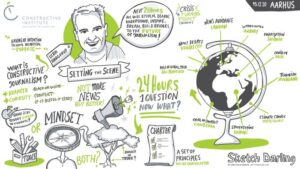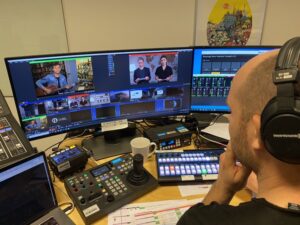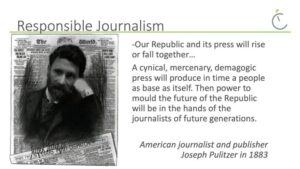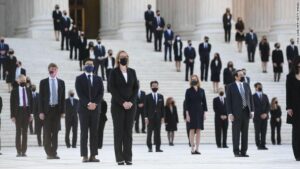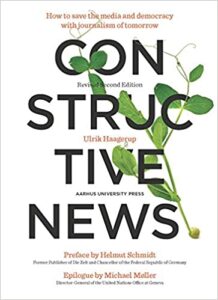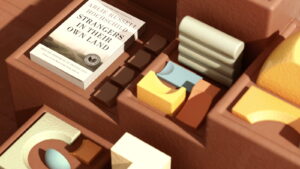Constructive Institute
24 hours for the future of journalism.
December 18, 2020Journalist Ulrik Haagerup, founder of the Constructive Institute.
Welcome to Constructive Institute and a global hub for people who believe that journalism might be part of the problem in the trust meltdown in our democracies – but also that journalism needs to be part of the solution. We want to change the global news culture in 5 years. Join us.
Follow the link to watch The Constructive News global conference.
‘We did it.’ -Ulrik
Dialogue. And listen.
October 10, 2020And lead.
Ruth Bader Ginsburg “knew the power of example—that if you live your own life according to your principles, others will follow,” writes her former clerk, Ryan Y. Park, Solicitor General of North Carolina.
The Atlantic
My Friend and Boss, Ruth Bader Ginsburg
“A big deal in the revival of local news: Nonprofit Mountain State Spotlight
Dialoging.
Dr. David Bohm:
“Dialogue is really aimed at going into the whole thought process and changing the way the thought process occurs collectively. We haven’t really paid much attention to thought as a process. We have engaged in thoughts, but we have only paid attention to the content, not to the process.
It is proposed that a form of free dialogue may well be one of the most effective ways of investigating the crisis which faces society, and indeed the whole of human nature and consciousness today. Moreover, it may turn out that such a form of free exchange of ideas and information is of fundamental relevance for transforming culture and freeing it of destructive misinformation, so that creativity can be liberated.”
Leah Garces:
The first lesson I learned is that we have to become comfortable with being uncomfortable. Only talking to people who agree with us, it’s not going to get us to the solution. We have to be willing to enter other people’s space. Because quite often, the enemy has the power to change the problem that we’re trying to solve.
The world’s smallest and biggest problems, they won’t be solved by beating down our enemies but by finding these win-win pathways together. It does require us to let go of that idea of us versus them and realize there’s only one us, all of us, against an unjust system. And it is difficult, and messy, and uncomfortable.
Seth Godin:
The arc and the arch.
They sound similar, but they’re not.
An arc, like an arch, is bent. The strength comes from that bend.
But the arc doesn’t have to be supported at both ends, and the arc is more flexible. The arc can take us to parts unknown, yet it has a trajectory.
An arch, on the other hand, is a solid structure. It’s a bridge that others have already walked over.
Our life is filled with both. We’re trained on arches, encouraged to seek them out.
But an arc, which comes from “arrow,” is the rare ability to take flight and to go further than you or others expected.
HOW TO HAVE A CONVERSATION WITH YOUR POLITICAL OPPONENTS
SANNE BLAUW
This story is from Strangers in Their Own Land by Arlie Hochschild.
‘For this book, the professor emerita of sociology immersed herself in the American political right wing. Over the course of five years, she regularly stayed in ultraconservative “Bayou Country” in Louisiana. She herself comes from lefter than left Berkeley, California. She couldn’t have left her bubble any further behind.
‘When left-wing sociologist Arlie Hochschild went to live in a right-wing stronghold in the American South, she was entering “enemy” territory.
But, by listening to the people there – instead of arguing against them – she distilled a clear picture: right-wing Trump supporters felt like victims of a society that had left them behind.
In an era where debate has descended into a televised shouting match, it’s easy to feel like you’re at war with people who disagree with you.
But Hochschild learned that by laying down our arms and trying to understand, even empathise with, our political opponents, we can learn how to have constructive political conversations.’
You don’t have to agree with political opponents to understand where they’re coming from
‘Having a heart-to-heart conversation with an ideological opponent can feel uncomfortable – unsafe even. But sociologist Arlie Hochschild proves that it pays off. She immersed herself in a conservative stronghold in the Southern United States for five years and wrote a book about it.’
Not everyone agrees with this approach, Hochschild said during a 2016 interview with Ezra Klein. It can feel as though you’re surrendering, laying down your weapons and walking over to the enemy. But, she says: “if you want to compare it to anything, it’s a diplomatic mission. It’s saying: look, we can work this out, let’s see what the basis of that could be”.
Whether it’s about corona, climate or benefits, let’s carry out these diplomatic missions more often. That doesn’t mean you have to agree with each other, but at least you’re making a genuine attempt to understand the other person.’


